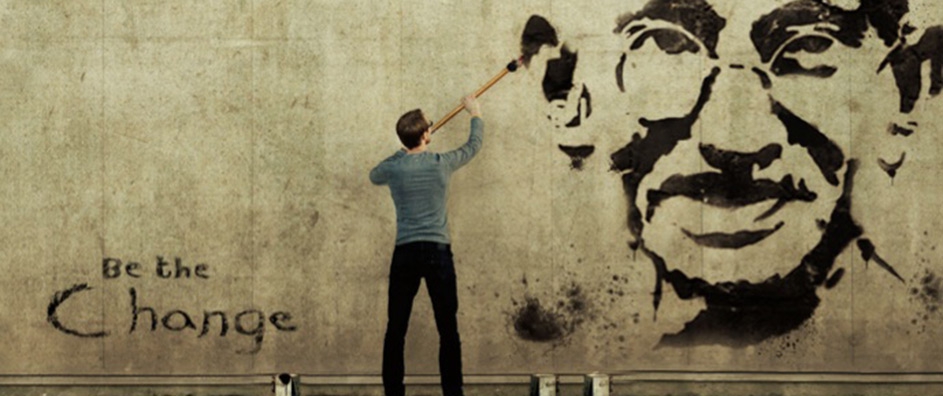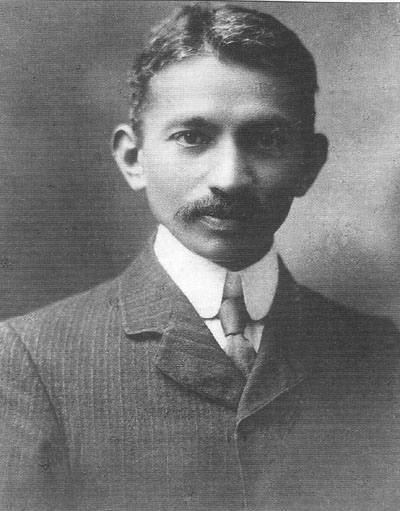The views expressed in our content reflect individual perspectives and do not represent the authoritative views of the Baha'i Faith.
“You cannot travel the path until you have become the path itself.”- attributed to Buddha
“Be the change you wish to see in the world.” – attributed to Gandhi
You’ve certainly heard these famous, extremely popular quotes, or even seen them on buttons and bumper stickers. These two, usually attributed respectively to Buddha and Mahatma Gandhi, probably aren’t accurate: Historians and scholars have not been able to find any record of Buddha or Gandhi ever saying or writing these aphorisms. Instead, Gandhi did say:
“If we could change ourselves, the tendencies in the world would also change. As a man changes his own nature, so does the attitude of the world change towards him.”
All of these sayings, whether accurately atttributed or not, and no matter who originally said them, contain a kernel of truth. Like the Golden Rule, each of them probably has an analogue in every philosophy and religion — exhorting us to first work on our own inner lives before trying to change others. The basic idea holds a universal, timeless message of spiritual development.
Like so much of our knowledge and understanding, the origins are hard to trace. This great wisdom probably emerged originally, as so many things did, from the oldest of the world’s Faiths. Profound versions of this idea exist in Hindu, Jewish and Zoroastrian scriptures. Their expression, less succinct and quote-friendly than later versions, likely suffered from multiple translations and oral history permutations. Then, like so much of that early religious insight, it found its way to the ancient Greek philosophers, who had a well-developed talent for coining pithy quotes:
“Let him that would move the world first move himself.” – Socrates
How does this happen, in a world so restricted by distance, war, and cultural obstacles? In fact, to ask an even broader question, where does great wisdom originally come from? Does it always have a source, or does it occur randomly? The Baha’i writings offer an explanation:
The children of Israel were in bondage and captivity in the land of Egypt four hundred years. They were in an extreme state of degradation and slavery under the tyranny and oppression of the Egyptians. While they were in the condition of abject poverty, in the lowest degree of abasement, ignorance and servility His Holiness Moses suddenly appeared among them. Although He was but a shepherd, such majesty, grandeur and efficiency became manifest in Him through the power of religion, that His influence continues to this day. His prophethood was established throughout the land and the law of His Word became the foundation of the laws of the nations. This unique personage, single and alone, rescued the children of Israel from bondage through the power of religious training and discipline. He led them to the Holy Land and founded there a great civilization which has become permanent and renowned and under which these people attained the highest degree of honor and glory. He freed them from bondage and captivity. He imbued them with qualities of progressiveness and capability. They proved to be a civilizing people with instincts toward education and scholastic attainment. Their philosophy became renowned; their industries were celebrated throughout the nations. In all lines of advancement which characterize a progressive people they achieved distinction. In the splendor of the reign of Solomon their sciences and arts advanced to such a degree that even the Greek philosophers journeyed to Jerusalem to sit at the feet of the Hebrew sages and acquire the basis of Israelitish law. According to eastern history this is an established fact. Even Socrates visited the Jewish doctors in the Holy Land, consorting with them and discussing the principles and basis of their religious belief. After his return to Greece he formulated his philosophical teaching of divine unity and advanced his belief in the immortality of the spirit beyond the dissolution of the body. Without doubt Socrates absorbed these verities from the wise men of the Jews with whom he came in contact. Hippocrates and other philosophers of the Greeks likewise visited Palestine and acquired wisdom from the Jewish prophets, studying the basis of ethics and morality, returning to their country with contributions which have made Greece famous. – Abdu’l-Baha, Baha’i World Faith, pp. 271-272.
Baha’is believe that the great ideas which advance humanity, the spiritual and creative impetus that drives our entire forward movement in progressive and intelligent ways, emerges first from the Prophets and Founders of the world’s major Faiths.
As a species, humanity has progressed from caves to massive cities; from small warring tribes to cooperative international treaties; from illiteracy to enormous scientific and artistic insight. This growth and maturation, the Baha’i writings tell us, originates directly from a loving Creator:
Praise be to God, throughout succeeding centuries and ages the call of civilization hath been raised, the world of humanity hath been advancing and progressing day by day, various countries have been developing by leaps and bounds, and material improvements have increased, until the world of existence obtained universal capacity to receive the spiritual teachings and to hearken to the Divine Call. The suckling babe passeth through various physical stages, growing and developing at every stage, until its body reacheth the age of maturity. Having arrived at this stage it acquireth the capacity to manifest spiritual and intellectual perfections. The lights of comprehension, intelligence and knowledge become perceptible in it and the powers of its soul unfold. Similarly, in the contingent world, the human species hath undergone progressive physical changes and, by a slow process, hath scaled the ladder of civilization, realizing in itself the wonders, excellencies and gifts of humanity in their most glorious form, until it gained the capacity to express the splendors of spiritual perfections and divine ideals and became capable of hearkening to the call of God. – Selections from the Writings of Abdu’l-Baha, p. 285.

















Comments
Sign in or create an account
Continue with Googleor